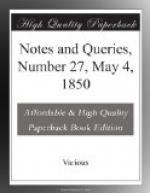In all this there is certainly nothing to warrant the conclusion that the German poem was the original of Heywood’s song; but, considering that the latter was produced so near to the same age as the former, that is, at the beginning of the sixteenth century, and considering that the older German poetical literature had already passed its culminating point, while ours was upon the ascending scale, there is likeness enough, both in manner and measure, to excite the suspicion of direct or indirect communication.
The etymology of the word “news,” on which you have recently had some notes, is a case in illustration of the importance of this point. I have never had the least doubt that this word is derived immediately from the German. It is, in fact, “das Neue” in the genitive case; the German phrase “Was giebt’s Neues?” giving the exact sense of our “What is the news?” This will appear {429} even stronger if we go back to the date of the first use of the word in England. Possibly about the same time, or not much earlier, we find in his same collection of Clara Haetzlerin, the word spelt “new” and rhyming to “triu.”
“Empfach mich uff das New
In deines hertzen triu.”
The genitive of this would be “newes,” thus spelt and probably pronounced the same as in England. That the word is not derived from the English adjective “new”—that it is not of English manufacture at all—I feel well assured: in that case the “s” would be the sign of the plural: and we should have, as the Germans have, either extant or obsolete, also “the new.” The English language, however, has never dealt in these abstractions, except in its higher poetry; though some recent translators from the German have disregarded the difference in this respect between the powers of the two languages. “News” is a noun singular, and as such must have been adopted bodily into the language; the form of the genitive case, commonly used in conversation, not being understood, but being taken for an integral part of the word, as formerly the Koran was called “The Alcoran.”
“Noise,” again, is evidently of the same derivation, though from a dialect from which the modern German pronunciation of the diphthong is derived. Richardson, in his English Dictionary, assumes it to be of the same derivation as “noxious” and “noisome;” but there is no process known to the English language by which it could be manufactured without making a plural noun of it. In short, the two words are identical; “news” retaining its primitive, and “noise” adopting a consequential meaning.
SAMUEL HICKSON.
* * * * *
FOLK LORE.
Charm for the Toothache.—A reverend friend, very conversant in the popular customs and superstitions of Ireland, and who has seen the charm mentioned in pp. 293, 349, and 397, given by a Roman Catholic priest in the north-west of Ireland, has kindly furnished me with the genuine version, and the form in which it was written, which are as follows:—




